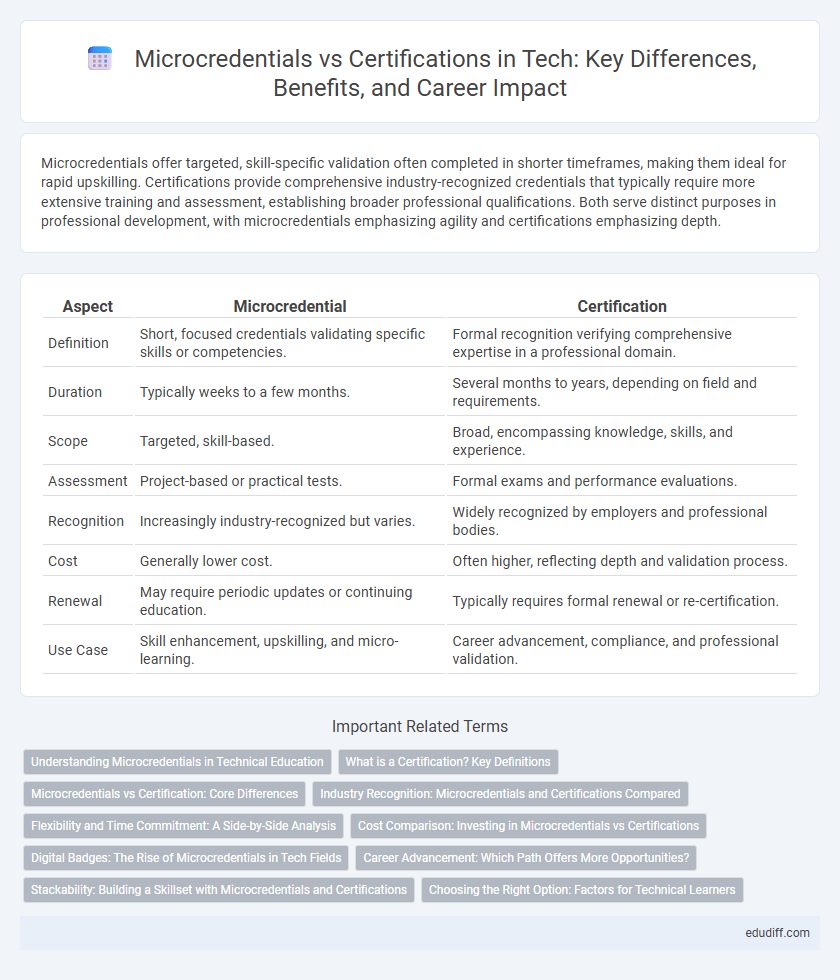Microcredentials offer targeted, skill-specific validation often completed in shorter timeframes, making them ideal for rapid upskilling. Certifications provide comprehensive industry-recognized credentials that typically require more extensive training and assessment, establishing broader professional qualifications. Both serve distinct purposes in professional development, with microcredentials emphasizing agility and certifications emphasizing depth.
Table of Comparison
| Aspect | Microcredential | Certification |
|---|---|---|
| Definition | Short, focused credentials validating specific skills or competencies. | Formal recognition verifying comprehensive expertise in a professional domain. |
| Duration | Typically weeks to a few months. | Several months to years, depending on field and requirements. |
| Scope | Targeted, skill-based. | Broad, encompassing knowledge, skills, and experience. |
| Assessment | Project-based or practical tests. | Formal exams and performance evaluations. |
| Recognition | Increasingly industry-recognized but varies. | Widely recognized by employers and professional bodies. |
| Cost | Generally lower cost. | Often higher, reflecting depth and validation process. |
| Renewal | May require periodic updates or continuing education. | Typically requires formal renewal or re-certification. |
| Use Case | Skill enhancement, upskilling, and micro-learning. | Career advancement, compliance, and professional validation. |
Understanding Microcredentials in Technical Education
Microcredentials in technical education offer targeted skill validation for specific competencies, allowing learners to quickly acquire and demonstrate expertise in niche areas such as cloud computing or cybersecurity. Unlike traditional certifications, microcredentials are often modular, stackable, and aligned with evolving industry standards, providing flexibility and continuous learning opportunities. Their digital badges enhance employability by verifying up-to-date skills through recognized assessment frameworks within the technical sector.
What is a Certification? Key Definitions
A certification is a formal recognition granted by a reputable organization that validates an individual's skills, knowledge, and competencies in a specific professional area. It typically requires passing standardized exams and meeting experience or education criteria to ensure expertise and industry standards compliance. Certifications are widely recognized by employers and serve as evidence of proficiency and commitment to continuous professional development.
Microcredentials vs Certification: Core Differences
Microcredentials emphasize targeted skill verification through concise, competency-based assessments, whereas certifications require broader knowledge validation often linked to professional standards. Microcredentials offer flexible, stackable learning paths suited for rapid skill adaptation, contrasting with certifications that typically demand extensive preparation and periodic renewal. The distinction highlights microcredentials' agility in addressing immediate industry needs versus certifications' role in establishing enduring professional credibility.
Industry Recognition: Microcredentials and Certifications Compared
Microcredentials offer targeted skill validation recognized by specific industries or employers, often reflecting emerging trends and practical expertise. Certifications typically carry broader industry recognition, backed by standardized testing and professional bodies, ensuring credibility and career advancement. Both serve distinct purposes in workforce development, with microcredentials driving agile skill acquisition and certifications establishing established proficiency benchmarks.
Flexibility and Time Commitment: A Side-by-Side Analysis
Microcredentials offer greater flexibility with shorter time commitments, often ranging from a few hours to a few weeks, allowing learners to acquire specific skills quickly. Certifications typically require longer preparation times, sometimes several months, and are geared toward comprehensive mastery and formal recognition in a professional field. This comparison highlights microcredentials as ideal for rapid skill acquisition, while certifications serve best for in-depth expertise and career advancement.
Cost Comparison: Investing in Microcredentials vs Certifications
Microcredentials typically require a lower financial investment, ranging from $100 to $1,000, making them accessible for skill-specific learning and rapid upskilling. Traditional certifications often cost between $300 and $3,000, reflecting their comprehensive coverage and industry recognition. Evaluating return on investment involves considering not only upfront costs but also time commitment and employer value in competitive job markets.
Digital Badges: The Rise of Microcredentials in Tech Fields
Digital badges represent a transformative shift in professional recognition, offering microcredentials that validate specific skills and competencies in tech fields. Unlike traditional certifications, microcredentials provide targeted, modular learning paths that align with rapidly evolving industry demands and emerging technologies. Companies and educational institutions increasingly adopt digital badges to enhance workforce agility and showcase verified expertise in areas like cybersecurity, data analytics, and cloud computing.
Career Advancement: Which Path Offers More Opportunities?
Microcredentials provide targeted skill validation often recognized in emerging fields, enabling rapid career advancement through specialized expertise. Certifications typically demonstrate comprehensive knowledge and industry standards, enhancing credibility for long-term career growth and leadership roles. Employers increasingly value a combination of both microcredentials and certifications to assess a candidate's adaptability and depth of knowledge in competitive job markets.
Stackability: Building a Skillset with Microcredentials and Certifications
Microcredentials offer stackable learning units that enable professionals to build targeted skillsets incrementally, enhancing flexibility and adaptability in rapidly evolving industries. Certifications consolidate these acquired microcredentials into comprehensive credentials, validating mastery of broader competencies for career advancement. Combining both approaches facilitates continuous, customized professional development aligned with specific career goals and industry demands.
Choosing the Right Option: Factors for Technical Learners
Technical learners should evaluate the depth and scope of skills required when choosing between microcredentials and certifications. Microcredentials offer targeted, skill-specific proof ideal for rapidly evolving technologies, while certifications validate comprehensive knowledge and experience recognized by industry standards. Consider factors such as career goals, time investment, industry demand, and employer preferences to select the optimal credential that enhances technical expertise and marketability.
Microcredential vs Certification Infographic

 edudiff.com
edudiff.com